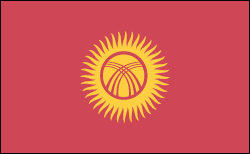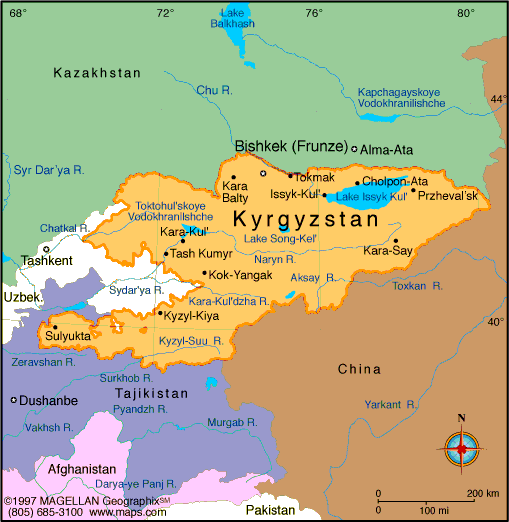KYRGYZSTAN

Geography: Kyrgyzstan (formerly Kirghizia) is a rugged country with the Tien Shan mountain range covering approximately 95% of the whole territory. The mountaintops are perennially covered with snow and glaciers. Kyrgyzstan borders Kazakhstan on the north and northwest, Uzbekistan in the southwest, Tajikistan in the south, and China in the southeast. The republic has the same area as the state of Nebraska.
Government: Constitutional republic.
History: The native Kyrgyz are a Turkic people who first settled in the Tien Shan mountains. They were traditionally pastoral nomads. Due to extensive Russian colonization in the 1900s, Russian settlers were given much of the best agricultural land. This led to an unsuccessful and disastrous revolt by the Kyrgyz people in 1916. Kyrgyzstan became part of the Soviet Federated Socialist Republic in 1924 and was made an autonomous republic in 1926. It became a constituent republic of the USSR in 1936. The Soviets forced the Kyrgyz to abandon their nomadic culture and adopt modern farming and industrial production techniques.
Kyrgyzstan proclaimed its independence from the Soviet Union on Aug. 31, 1991. On Dec. 21, 1991, Kyrgyzstan joined the Commonwealth of Independent States. The country joined the UN and the IMF in 1992 and adopted a shock-therapy economic program. Voters endorsed market reforms in a referendum held in Jan. 1994, and in 1996, referendum voters overwhelmingly endorsed proposed constitutional changes that enhanced the power of the president.
There is an ethnic and economic divide between the more developed north with its Kyrgyz population and the impoverished south, which is made up of Uzbeks and a diverse group of other ethnicities. About 50% of the entire population lived below the poverty line in 2003.
Since 1999, several groups of radical Islamic gunmen, believed to be from Uzbekistan or Tajikistan, have led raids and kidnappings from base camps in Kyrgyzstan's mountains.
Government: Constitutional republic.
History: The native Kyrgyz are a Turkic people who first settled in the Tien Shan mountains. They were traditionally pastoral nomads. Due to extensive Russian colonization in the 1900s, Russian settlers were given much of the best agricultural land. This led to an unsuccessful and disastrous revolt by the Kyrgyz people in 1916. Kyrgyzstan became part of the Soviet Federated Socialist Republic in 1924 and was made an autonomous republic in 1926. It became a constituent republic of the USSR in 1936. The Soviets forced the Kyrgyz to abandon their nomadic culture and adopt modern farming and industrial production techniques.
Kyrgyzstan proclaimed its independence from the Soviet Union on Aug. 31, 1991. On Dec. 21, 1991, Kyrgyzstan joined the Commonwealth of Independent States. The country joined the UN and the IMF in 1992 and adopted a shock-therapy economic program. Voters endorsed market reforms in a referendum held in Jan. 1994, and in 1996, referendum voters overwhelmingly endorsed proposed constitutional changes that enhanced the power of the president.
There is an ethnic and economic divide between the more developed north with its Kyrgyz population and the impoverished south, which is made up of Uzbeks and a diverse group of other ethnicities. About 50% of the entire population lived below the poverty line in 2003.
Since 1999, several groups of radical Islamic gunmen, believed to be from Uzbekistan or Tajikistan, have led raids and kidnappings from base camps in Kyrgyzstan's mountains.

Map of
Kyrgyzstan
President: Almazbek Atambayev (2011)
Prime Minister: Temir Sariyev (2015)
Total area: 73,861 sq mi (191,300 sq
km)
Population (2014 est.): 5,604,212;
(growth rate: 1.04%); birth rate: 23.3/1000; infant mortality rate:
28.71/1000; life expectancy: 70.06.
Capital and largest city (2011 est.):
Bishkek, 839,000
Monetary unit: Som
National
name: Kyrgyz Respublikasy
Languages:
Kyrgyz (official) 64.7%, Uzbek 13.6%, Russian (official) 12.5%, Dungun 1%, other 8.2% (1999 census)
Ethnicity/race:
Kyrgyz 64.9%, Uzbek 13.8%, Russian 12.5%, Dungan
1.1%, Ukrainian 1%, Uygur 1%, other 5.7% (1999)
Religions:
Islam 75%; Russian Orthodox 20%; other 5%
National Holiday:
Independence Day, August 31
Literacy rate: 99.2% (2009 est.)
Economic summary: GDP/PPP (2013 est.):
$14.3 billion; per capita $2,500. Real growth rate: 7.4%.
Inflation: 6.8% (2013). Unemployment: 8.6% (2011 est.).
Arable land: 6.38%. Agriculture: tobacco, cotton, potatoes,
vegetables, grapes, fruits and berries; sheep, goats, cattle, wool.
Labor force: 2.344 million (2007); agriculture 48%, industry 12.5%,
services 29.5% (2005 est.). Industries: small machinery,
textiles, food processing, cement, shoes, sawn logs, refrigerators,
furniture, electric motors, gold, rare earth metals. Natural
resources: abundant hydropower; significant deposits of gold and
rare earth metals; locally exploitable coal, oil, and natural gas;
other deposits of nepheline, mercury, bismuth, lead, and zinc.
Exports: $1.881 billion (2013 est.): cotton, wool, meat,
tobacco; gold, mercury, uranium, natural gas, hydropower; machinery;
shoes. Imports: $5.082 billion (2013 est.): oil and gas,
machinery and equipment, chemicals, foodstuffs. Major trading
partners: UAE, Russia, China, Uzbekistan, Kazakhstan, Afghanistan, Turkey (2012).
Communications: Telephones:
main lines in use: 489,000 (2012); mobile cellular: 6.8 million (2012). Broadcast media: state-run
television broadcaster operates 2 nationwide networks and 6 regional
stations; roughly 20 private TV stations operating with most
rebroadcasting other channels; state-run radio broadcaster operates 2
networks; about 20 private radio stations operating (2007). Internet Service
Providers (ISPs): 115,573 (2012) Internet users: 2.195 million (2009 ).
Transportation: Railways: 470 km (2010).
Highways: total: 34,000 km (2007 est.). Waterways: 600
km (2010). Ports and harbors: Balykchy (Ysyk-Kol or Rybach'ye).
Airports: 28 (2013).
International
disputes: Kyrgyzstan has yet to ratify the 2001 boundary
delimitation with Kazakhstan; disputes in Isfara Valley delay
completion of delimitation with Tajikistan; delimitation of 130 km of
border with Uzbekistan is hampered by serious disputes around enclaves
and other areas.
-------------------- o --------------------
No comments:
Post a Comment